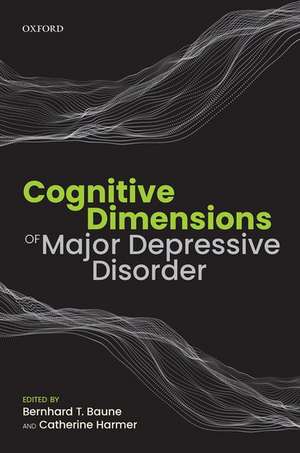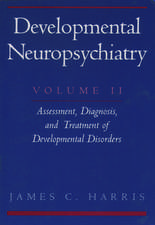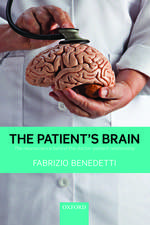Cognitive Dimensions of Major Depressive Disorder
Editat de Bernhard T. Baune, Catherine Harmeren Limba Engleză Paperback – aug 2019
Preț: 516.83 lei
Preț vechi: 568.30 lei
-9% Nou
Puncte Express: 775
Preț estimativ în valută:
98.91€ • 102.88$ • 81.65£
98.91€ • 102.88$ • 81.65£
Carte disponibilă
Livrare economică 13-19 martie
Preluare comenzi: 021 569.72.76
Specificații
ISBN-13: 9780198810940
ISBN-10: 0198810946
Pagini: 320
Dimensiuni: 155 x 233 x 15 mm
Greutate: 0.52 kg
Editura: OUP OXFORD
Colecția OUP Oxford
Locul publicării:Oxford, United Kingdom
ISBN-10: 0198810946
Pagini: 320
Dimensiuni: 155 x 233 x 15 mm
Greutate: 0.52 kg
Editura: OUP OXFORD
Colecția OUP Oxford
Locul publicării:Oxford, United Kingdom
Notă biografică
Prof. Bernhard T. Baune is Cato Chair and Head of the Department of Psychiatry at The University of Melbourne, Australia. Prof. Baune is a Fellow of the Royal Australian and New Zealand College of Psychiatrists (FRANZCP), Australia. He leads an extensive research program into personalised psychiatry, prediction and biomarker research in psychiatry and treatment response prediction and in neuroimmunology. Key research achievements include an in-depth understanding of the interaction between the immune and nervous system, the development of a systems biology approach for response prediction and the establishment of innovative personalised clinical trials in major psychiatric disorders. He has a particular interest in cognitive function and psychosocial function in psychiatric disorders and in the severe course of mental illness, treatment response and recovery.Prof. Catherine Harmer is the director of the Psychopharmacology and Emotional Research Lab (PERL) based at the University Department of Psychiatry in Oxford, which comprises a multi-disciplinary team including graduate research assistants, DPhil students, post-doctoral researchers, Psychiatrists and Pharmacologists. The research of the group focuses on the psychological mechanisms of antidepressant drug action by exploring drug effects on human models of emotional processing. A range of methodologies are used, including neuropsychological testing, transcranial magnetic stimulation and functional neuroimaging with fMRI and PET in healthy volunteers and patient samples. This research has the potential to integrate psychological and pharmacological views of depression and treatment and has challenged the way in which we typically consider drug treatment for depression to work.























